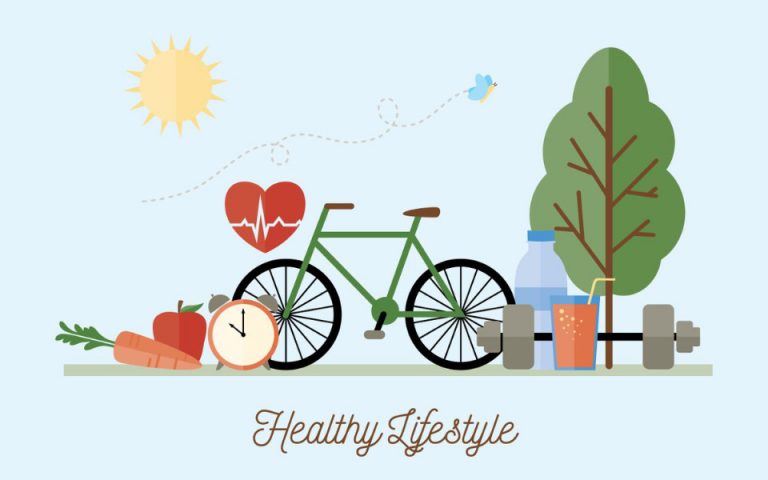“ God Almighty first planted a garden. And indeed, it is the purest of human pleasures. It is the greatest refreshment to the spirits of man.”
– Francis Bacon (1561-1626)
Do you know the full benefits of gardening for a healthy mind, body, and environment? Today’s focus is on the medicinal, magical, marvellous benefits of gardening. We will cover the mental and physical health benefits of gardening. And show how exploring gardening heals, uplifts, nourishes, and inspires.
The social and therapeutic benefits of gardening are just as important because gardening is possibly the most holistic form of exercise one can indulge in. Gardening is accessible. And it gets our creative juices flowing. Children, the elderly, even the infirm, get benefits from spending time in the garden. Not all gardening is strenuous. And you don’t even need your own space to garden. You can create a miniature garden, a zen garden, an indoor garden, or a garden made up of tubs, containers, and hanging baskets.
Getting a healthy dose of vitamin D, and practising mindful meditation at the same time means gardening benefits the mind, body, and soul together. It brings us into harmony with our environment, reduces stress levels, and in some cases may even boost serotonin levels.
Intrigued?
Read on.
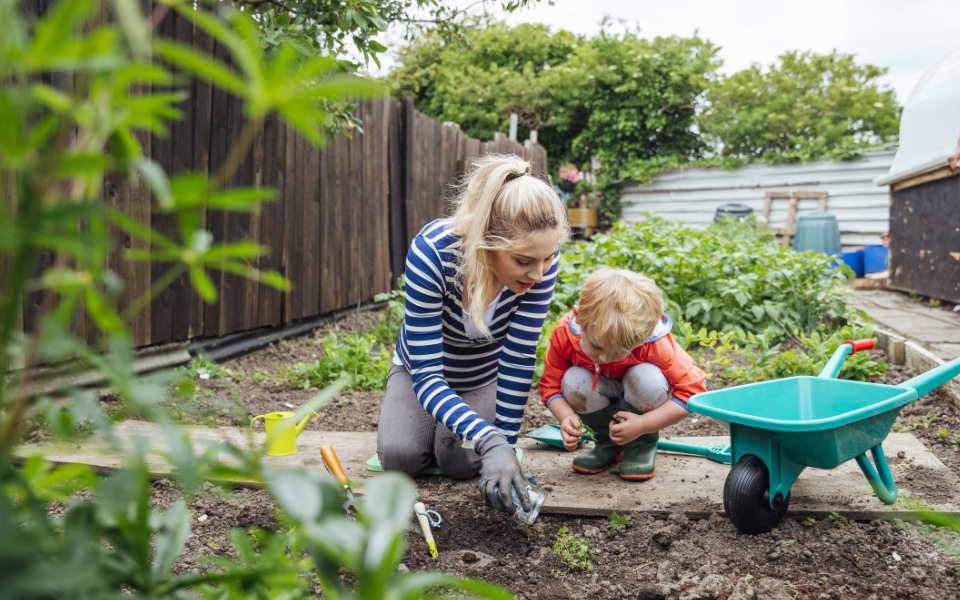
Why Is Gardening Important?
When you garden you are present in the moment but you may find your thoughts keep wandering. Just go with the flow. This process is vital for reducing stress levels and gaining clarity on issues you may lurk in the deep recesses of your mind. During a gardening session, you get time to allow your thoughts to settle and you get access to answers you may never have even thought about.
Gardening is a creative endeavour. Once you tap into this type of energy you might get bombarded with ideas and innovations. But you get to choose. You can indulge yourself in this type of thinking or you can channel the same energy into staying present and switch over to a state of observation and inner silence. This is when the magic happens, and for a brief moment you get to feel completely connected to Mother Nature and you can actually feel the physical surge of extra energy rushing through your entire body.
Gardening relaxes you, but you can also get a good physical workout. Gardening organically, without the use of synthetic fertilizers, pesticides, and herbicides means you and your family get to eat homegrown, organic fruit and vegetables that boost your immunity, lower the risk of obesity, diabetes, and cancer, and soothe your soul. Spending time in a garden brings joy and can lift you out of a depressed state or calm you down if you’re feeling anxious.
A garden adds aesthetic appeal. In ancient times it was the kings, queens, emperors, and sultans who had the luxury of cultivated gardens. Peasants did not have the luxury of time to plant gardens for pleasure. They needed to grow food in their allotments and fields. Gardening is often seen as a pastime, hobby, or lifestyle. Even people confined to apartments manage to grow container plants and create indoor gardens that bring greenery and life to an otherwise dull living space.
Every culture has a tradition of gardening, Every country has a collection of unique, endemic, and indigenous species. Every place in the world contains plants that can be locally harvested and grown to provide beauty, scent, medicine, shade, and food.
Historically, adventurers and explorers were responsible for bringing new plants home with them. Exotic plants always add an exciting dimension to gardens. But as you will read further on, this is sometimes detrimental to the ecosystems that will form naturally, so often it’s better if you plant indigenous trees and flowers.
Gardening is a form of exercise, unique in that it works the mind, body, and soul simultaneously. Gardening is a healthy activity that keeps us connected to Mother Nature. Plants are essential to our well-being. Whether we decorate our living spaces with bunches of cut flowers, keep a window box of herbs outside the kitchen door, or cultivate outdoor gardens for pleasure and practical reasons, the fact remains, we need plants. Plants heal, plants feel, plants nourish, plants filter our air and water. They provide housing for birds and wildlife and provide raw materials for humans to build shelter, make clothing and get daily nourishment and medicine.
Gardens provide food and medicine. Gardening to grow food is very popular again. In part, because of what 2020 showed us, but also because eating organic, locally grown food is better for our physical health, as well as for the planet as a whole. When you have an organic garden you should garden barefoot, even the soil can read what your body needs. And when you harvest your various fruits and roots they will be optimized to feed you what you need! Does this sound unbelievable? Don’t worry, everything we discuss here can be backed up by science.
Let’s jump straight in!
10 Benefits of Gardening
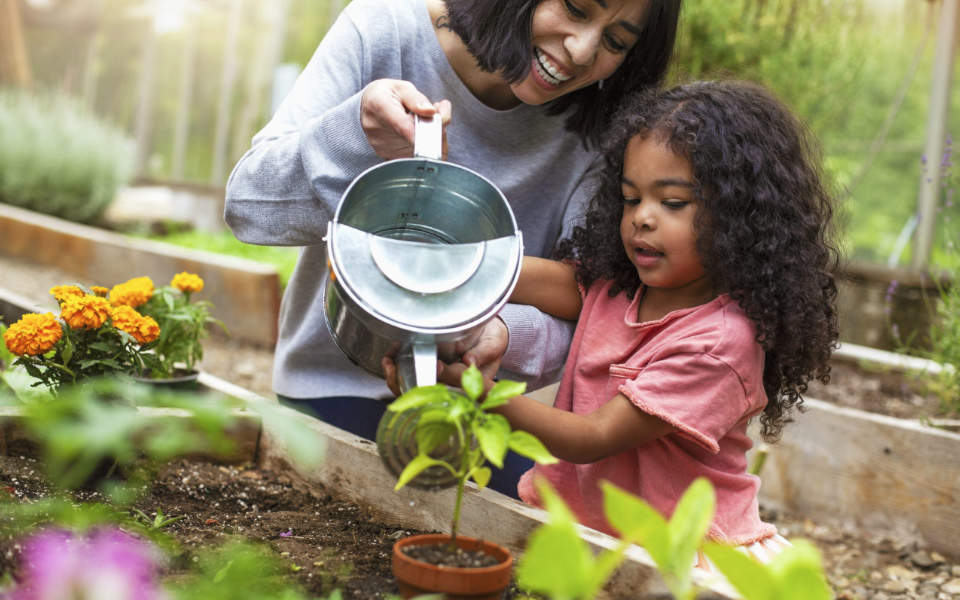
Benefits of Gardening, UK:
Besides the health benefits, the benefits of gardening in the UK are made easier by the practice of renting small parcels of land, called allotments. This means people who live in flats still get to create outdoor food gardens and reap the rewards of sunshine and fresh air. It’s also an opportunity to build a strong local community. The social aspect of this type of gardening must not be underestimated. An excellent example of a community garden can be found in St. Ives and we’ll get into more detail further on.
The climate for UK gardening is broken into definite spring, summer, autumn, and winter seasons. Unlike more tropical climates, the UK experiences mild summers and cold winters. But hothouses (greenhouses) and indoor growing are popular alternatives for those who want to grow food all year round.
1. Health Benefits of Gardening: An Holistic Pastime
The health benefits of gardening are physical, mental, emotional, and spiritual. This means gardening can be seen as a holistic endeavour. But many people suffer from back pain, knee pain, arthritis, and other forms of pain that make gardening a challenge.
Certain aspects of gardening require one to dig with a spade or lift fairly heavy bags of compost and container plants, but this should not deter anyone from doing a bit of gardening. If you have bad knees or an injured back, strenuous garden work will leave you debilitated for a few days after. But you can work around these issues with the use of cushioned pads and mats to kneel on. Or find a stool and table that affords you the luxury of sitting in a comfortable position while you make cuttings or weed small pots that can be easily lifted onto a table and weeded from a standing or sitting position.
Even if you cannot physically get stuck into gardening, you can get a family member, a friend, or a garden service to come in and assist with the tasks you can no longer carry out yourself. There are many creative ways to work with plants that don’t require strenuous exertion.
Adapt your environment by planting into tubs and containers so that you still get to prune and water shrubs. Create areas off the ground where you can place tubs of herbs, with easy access to when cooking.
2. Physical Benefits of Gardening
If you do your own garden work you probably carry out the following tasks:
- Mowing
- Raking
- Turning beds
- Pruning
- Watering
- Weeding
- Fertilizing (using organic fertilizers), aerating, resodding, etc
- Planting seedlings
- Taking cuttings
- Repotting into and out of containers and tubs
- Composting
Gardening is a wonderful way to exercise, unwind, and get fresh air and sunshine.
From a physical aspect, gardening:
- Increases cardiovascular fitness. (200-500 calories per hour). [1]
- Improves muscular development, hand-eye coordination, and strength, specifically in the hands, legs, and back. [2]
- Gives you exposure to vitamin D. Vitamin D improves calcium levels and bone density.
- Reduces stress levels. [3]
- Boosts immunity. [4]
a) Cardiovascular Fitness
Cardiovascular exercise is any type of movement that uses large muscle groups. Cardio raises your heartbeat and the rate at which oxygen and blood flow through your system. Gardening burns 200-500 calories per hour. This is equivalent to swimming, running, dancing, or cycling. Of course, it also depends on what gardening tasks you carry out and at what intensity. But you get the picture!
Cardiovascular fitness does the following:
- Increases energy and stamina.
- Reduces risk of heart disease. [5]
- Reduces risk of dementia. [6]
- Improves brain and joint health. [7]
- Improves blood lipid profile (cholesterol). [8]
b) Tones and Strengthens
While cardio exercise improves your heartbeat and oxygen flow, resistance training, like lifting heavy bags, digging with a spade, mulching with a garden fork, etc. increases muscular strength and tones muscles. It also strengthens bones.
c) Reduces Stress Levels
Because gardening puts you in a relaxing state of mind, even when you are physically exerting yourself, your stress hormones reduce the amount of cortisol and adrenaline that gets supplied. This means the other hormones function are more balanced. Gardening elevates your mood. This may be due to the Mycobacterium vaccae, a non-pathological bacteria. Studies show that this bacteria increases serotonin levels. Serotonin is one of the feel-good hormones that keep our anger levels down and our spirits up.
d) Boosts Immunity
Once again we have the beneficial bacteria in the soil to thank for boosting immunity. Add to this a healthy dose of vitamin D from the sunshine and not only is your immune system given a boost, but so is your bone health and calcium levels.
A healthy immune system fights free radicals that can cause other diseases like cancer.
3. Benefits of Gardening for Mental Health
a) Is gardening good for your mental health?
Absolutely! Whether you spend time caring for indoor plants or gardening outdoors, in the fresh air, the mental health benefits of gardening are amazing. It is scientifically proven that plants can boost productivity levels, reduce mental fatigue, and improve cognition. [9]
b) Improves serotonin levels
As mentioned above, when you come into contact with the soil you will breathe in Mycobacterium vaccae. M.vaccae is just one of many microbial organisms present in the soil. Inhaled, this bacteria may increase serotonin levels.[10] Serotonin stabilises moods and also aids nerve function, digestion and sleep.
c) Improves brain function: memory, cognition, creativity [11]
A Korean study [12] that used 41 seniors, over 76 years of age, determined that gardening increased various brain nerve growth factors. These factors are responsible for the functioning of cognition and memory. The results of the study backed up theories that gardening has the potential to reduce the risk of dementia and Alzheimer’s disease.
d) Reduces stress
Stress is the silent killer in today’s frenetic world. Stress can be from physical, mental, emotional and environmental factors. So when stress is reduced it improves both your physical and mental well-being. [13]
4. Social Benefits of Gardening
Gardening is far more than planting food or cultivating blooms. Gardening enthusiasts often join gardening clubs, online gardening groups and forums. People who love plants have an instant connection with others who also love plants. You can have nothing else in common, have different political and religious affiliations but gardeners can overlook differences when the conversation is about plants.
For those of you who are already plant-lovers, you will agree that being sociable with people is one thing but being sociable with plants is also quite normal and natural. Plants are living entities and as such, they have the ability to feel and “think”. There is a book called the Secret Life of Plants, written by Peter Tompkins and Christopher Bird in 1973. This wonderful book goes into great detail about the metaphysical aspects and scientific proof of gardening in organic non-chemical ways.
It backs up claims that talking to your plants does have positive effects on both you and your plant! So if getting social with homosapiens is not convenient, your green friends will never let you down. They are excellent listeners but are usually strong, silent types…
Being sociable reduces depression and improves your overall mental well-being. Humans are social creatures. And even “loners” still need human interaction. In 2020, many people were cut off and isolated from their friends and family. So if ever there was a perfect time to take up gardening, it’s now!
Even the elderly, who live in old-age homes were prevented from mixing with their fellow residents. It is possible that during this time those who spent time in their gardens, or indoors with houseplants, may have fared better than people who went without greenery for extended periods. See the section “Benefits of Gardening for the Elderly” below.
When we socialise we improve our memories and cognitive skills. Studies have found that elderly patients with high social networks and social engagements could reduce the cognitive decline by 39 and 91%, respectively. [14]
5. Therapeutic Benefits of Gardening [15]

a) Forest Bathing – Shinrin-yoku
Shinrin-yoku literally translates to forest (shinrin) bath (yoku). This Japanese form of nature therapy is proven to reduce stress, lower blood pressure, enhance creativity, and increase feelings of well-being.
Forest bathing is exactly what it sounds like. You go into a forest and allow your senses to experience the colours, smells, sounds, sights, and textures. There are physical and mental benefits to shinrin-yoku but the spiritual benefits should be mentioned here first. A forest is alive with birds, insects, and mammals. When you enter a forest, immediately you are transported to a magical place. Both physically and with your mind. A forest evokes feelings of timelessness, stress melts away, you can transport yourself to a place where the only thing that matters is this very moment. And that feeling literally fills you with a renewed vitality and a deep calm at the same time.
The scent of a forest is made up of the soil, the decaying leaves, the dew-heavy foliage, and the heady smell of certain leaves and bark. This is aromatherapy in its raw state. These smells activate parts of the brain and you gain the benefits. [16]
The Japanese recognised that populated cities were creating a society that was disconnected from nature. They were aware of the detrimental effects this had on people. Today, forest bathing is part of their national health care practices. It’s also interesting to note that Japan is one of the blue zones of the world. Blue zones are areas known for longevity.
If you don’t have access to a forest, find a park filled with trees. And experience the transformative nature of immersing yourself in the green light that filters through the forest canopy and touches your skin. Shinrin-yoku is an activity that you can embark on alone or with friends and family. Spending time in nature with friends also has social benefits, mentioned above.
b) Barefoot Gardening: To Get Grounded
Take your shoes and socks off when you garden. When the soles of your feet make contact with the earth you become “grounded” This is a scientifically proven fact.[17]. Electrical charges reconnect us with the earth and give us access to the Earth’s healing energy. [18]
Grounding also:
- Reduces inflammation and pain
- Reduces stress
- Improves sleep
- Increases energy
c) Increases Creativity
Creativity is often blocked when we fear judgment or failure. Gardening is one of the easiest and most effective ways to get into a state of mindfulness. Raking, sweeping, and even weeding the lawn can be carried out whilst practising mindful meditation. There is a connection between creativity and mindfulness. Gardening is a very creative endeavour. And it is easy to “get into the creative flow” when gardening. The more you tune in to your creative mind the more accessible it becomes. So the more you garden the more you’ll get the creative juices flowing. When people create they are far less likely to get depressed or overeat.
d) Enhances the practice of mindfulness
As it reads above, there is a connection between mindfulness and creativity. [19] And both these brain states are achieved through spending time working or relaxing in a garden. According to the late Alan Watts, a British philosopher and writer, the perfect times to practice mindful meditation is when you are involved in mundane, menial tasks. Garden tasks like raking leaves, sweeping or weeding, are ideal opportunities to engage in mindful meditation. Research has shown that practising mindfulness is an accepted form of therapy. And research shows that mindfulness can reduce anxiety and depression. [20]
6. Benefits of Gardening for the Elderly [21]
Gardening is an enjoyable pastime for our old folks; it is an activity that reminds them of a time when life was slower. But also old people get a lot of their wisdom from years and years spent gardening. Take some time out and spend some quality time with an older person, you’ll be fascinated by the stories they can tell.
And for younger gardeners, time spent with veteran gardeners is golden, they share tips and knowledge that only comes from experience!
a) Improves mobility and flexibility
Gardening helps with mobility and flexibility, For many, it will be the only exercise they get. Gardening develops our motor skills. Motor skills include coordination, balance, hand/eye coordination, and building strength. Our brains refine motor neuron pathways when we engage in exercises that use these gross motor skills. And our entire body benefits when motor skills are used; from the large muscles in legs and arms to the core muscles in our abdomen, neck, and back.
Movements that develop gross motor skills include:
- Walking
- Running
- Standing
- Jumping
- Sitting
- Lifting
- Kicking
- Climbing
Gross motor skills help to develop fine motor skills. Fine motor skills get used when we work the smaller muscles in our hands, fingers, wrists, and feet. Fine motor skills get developed by grasping, writing, buttoning, threading, cutting, etc.
b) Decreases the risk of Alzheimer’s disease and dementia.
Dementia is a chronic degenerative disease that affects 5-8% of people over 60 years of age. Alzheimer’s Disease is the most common form of dementia, presenting in 60-70% of all cases. Dementia affects cognitive function, patients lose their ability to remember, solve problems, and do things that they previously loved, like sewing, tinkering around in the garage and other activities enjoyed by retired folk.
Doing things that bring pleasure, like gardening, can stave off feelings of depression. Depression leads to apathy and doing less. The exercise one gets from garden work helps keep motor skills well-oiled. This means other activities like driving and going shopping can still be carried out.
But it is the thinking and planning that goes into gardening that slows the progress of dementia. Gardening tasks need to be carried out according to seasons so planning what to plant, where to plant and when to plant helps cognitive functioning. Gardeners need to be observant of changes in plant health, weather forecasts, and seasonal needs, like when to fertilise, prune, water, etc.
7. Benefits of Gardening in Childcare
The benefits of gardening for children are often similar to the elderly. But whereas gardening can decrease the effects of dementia in the aged, it has the ability to develop reasoning and discovery in children. When children play and work in the garden their motor skills develop as does their creativity and confidence.
How does gardening help a child’s development?
Besides the educational and physical benefits of gardening for children, it also enhances their ability to learn. It increases feelings of well-being and self-understanding, improves interpersonal relationships, and develops the ability to cooperate within a group. (Habib and Doherty, 2007)(Robinson and Zajiczek, 2006) [22]
As mentioned above, mindfulness contributes to a reduction in anxiety and depression. Mindfulness training in early childhood also has many benefits. [23] One of the main benefits is that it can lead to the development of self-regulatory skills. This means children will develop the skill of regulating impulse behaviours. This builds self-esteem, supports school readiness, and develops the skills needed for both reflection and problem-solving. Children who don’t have these skills often show the need for instant gratification and in adulthood can present as addictions and other personality disorders.
Gardening helps children to experience mindfulness training organically, pun intended!
Encouraging children to join in with gardening means they will also be using their motor skills. And as was discussed above, developing motor skills aid muscle development and cognitive function. We cannot deny how interconnected everything in life is. We have an innate connection to nature and when we stay connected our overall health remains high.
8. Environmental Benefits of Gardening
Not enough can be said about the environmental impact gardening has on the planet. This is even more pertinent when gardens are developed in highly urbanised areas. Greening your neighbourhood should be a top priority. And an enthusiastic community could easily approach their local borough with proposals to start community gardens.
Green plants give off oxygen and absorb carbon dioxide during the day. This means plants filter our air and reduce the effects of pollution. Ecological gardening is a great way to turn a small urban space 9or a large piece of land) into a haven for birds, insects, butterflies, and other small essential mammals that create eco-systems where there would otherwise not be there.
Gardens can be created to suit the environment this strengthens the plants and also creates a garden that thrives from being given ideal conditions.
Waterwise gardens for drought-stricken areas, gardens with water features to create a zen space (where you can relax to the sound of trickling water), forest gardens, food gardens, and many other specialised gardens, all benefit the environment.
9. Benefits of Gardening as a Hobby
As mentioned before, gardening is a pleasure activity that brings physical and mental health benefits. It also keeps us engaged and interested in life and other people. When we are passionate about what we do we want to share our experiences and knowledge with others. We like to stay up to date with new advancements in gardening, new breeds and cultivars that come out, and solutions to common gardening problems. This type of information can be gleaned from magazines but many people choose to join forums and groups on social media. There are garden shows and flower exhibitions that attract avid gardeners and gives everyone a chance to mingle, network, and make new friends – in real-time. Much of our social interaction has become virtual and it’s important for society to make the effort to still connect face to face with like-minded people.
10. Spiritual Benefits of Gardening: Soul Therapy
It used to be difficult to speak about the soul therapy we get from gardening without coming across as a hippy relic from the sixties. But this is no longer the case. A more open-minded society has developed thanks to the global nature of the internet. Millennials, religious people, and social justice warriors have all embraced the holistic approach to living and health and this has made it easier for people to experience how the soul heals when the body and mind are healthy.
Gardening, and being in nature, has the ability to give the gardener a unique and highly personalised experience. When one experiences something that is difficult to put into words it is often due to the metaphysical nature of the experience. Nowadays people are more open-minded to trying different techniques to reduce stress and improve health. Mindfulness, forest bathing, walking in nature, being barefoot when you garden, all these aspects are part of developing a passion for a better life.
When people experience interconnectedness or grasp the concept of it, it can be a life-changing experience. Old paradigms get shattered forever and a new perspective on how we view ourselves and our lives develop. This is why we are born. We are here to grow and develop and be the best versions of ourselves that we can be. To accept and understand that living an authentic life is essential to being content and at peace is truly a gift. And it is in nature that we find this remedy.
Gardening Ideas: Bring Nature Back to Your Garden
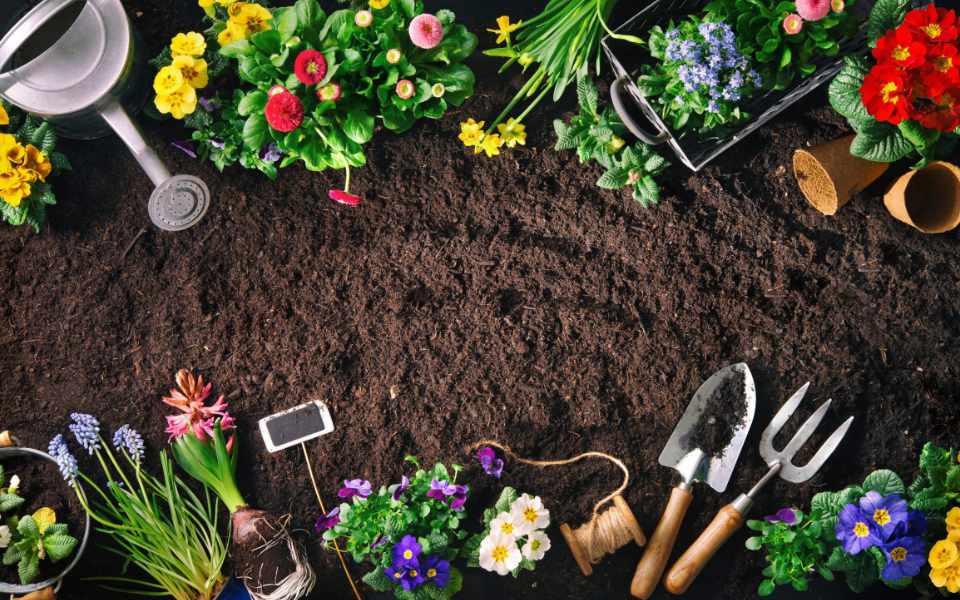
1. Styles and Types of Gardening
Have you heard of permaculture, biodynamic planting, moon gardening, organic gardening, companion planting, guerilla gardening, or urban gardening? All these types of gardening philosophies and styles embrace the interconnectedness between the soil, the plants, the insects, birds, wildlife, and you.
a) Permaculture
The term “permaculture” was coined in the 70s by two Australians, Bill Mollison and David Holmgren. Permaculture stands for permanent agriculture. It is used to describe any planting system that uses the surrounding resources in economically and environmentally friendly ways. So it is a very broad term. For example, you can decide how you want to plan your garden and then change your mind as you go along. Permaculture is the complete opposite of monoculture.
Instead of planting one crop over a large area, you can plant a variety of plants that complement each other, in a much smaller space. You don’t need to plant a row of corn, a row of spinach, a row of green peppers, etc. What you can do is measure out a section of ground and then plant a variety of plants (in rows or just as you wish). This helps to stop insect infestations because they are usually plant-specific and prefer one veg over others. When you plant a row of one cabbage, one green pepper, one calendula, one brinjal, one swiss chard, etc. The insects get confused. You may sacrifice one plant but the rest of your crop will be spared.
Over time, you’ll find that companion planting helps to control insect outbreaks. It reduces fungal and bacterial diseases. And also allows insects like ladybirds, praying mantis and other “cool” insects to establish colonies and populations in the area. They keep insects like aphids, mealy bugs, scale, and beetles under control. And you end up with a miniature eco-system that is bursting with variety and healthy, organic vegetables that are without blemishes or insect stings.
b) Biodynamic Gardening
Biodynamic gardening is similar to permaculture. It also focuses on creating and maintaining healthy, living soil. But the emphasis on soil is far greater than with permaculture, which looks at creating a variety of plants and incorporating various gardening techniques like water harvesting and collecting heirloom seeds.
The other aspect of biodynamic farming is the attention paid to seasons, moon cycles, and interconnectedness of all living organisms. The term was coined long before permaculture, way back in 1924.
c) Astrological Gardening or Moon Gardening
This is a form of gardening that relies on moon cycles to tell us when to sow seeds and when to harvest crops. But it is so specific that the various cycles of the moon can actually influence different types of crops. So sometimes it will be more beneficial to sow root veg at a certain time, while other times it will be better to sow the seeds for greens or fruiting vegetables, etc.
This is not some washed-up hippy theory but actually works based on the pull the moon has on water ocean tides and even women’s menses. At certain times the hygroscopic water molecules will be denser and more readily available than at other times. This makes the success rate of germination higher.
d) Companion Planting
Again, this form of gardening is connected to permaculture and biodynamic gardening. Certain plants give each other essential nutrients they need to grow better. The best example is tomatoes and basil. And it is quite interesting to note that when we cook, tomato and basil complement each other. This type of planting also reduces insects infestations. For example, nasturtiums attract aphids so planting nasturtiums in between your veggies will lessen the chances of aphids attacking your other greens. Aphids secrete a substance that attracts ants, so that brings a secondary problem to the garden and the health of the plants.
Companion planting is mind-blowing once you start exploring the different benefits. Did you know planting the common marigold can deter nematodes? Nematodes are worms (there are over one million species!!) They attach to roots and this inhibits the plants’ ability to suck up water and nutrients from the soil. It also means if you garden without gloves you can also get worms.
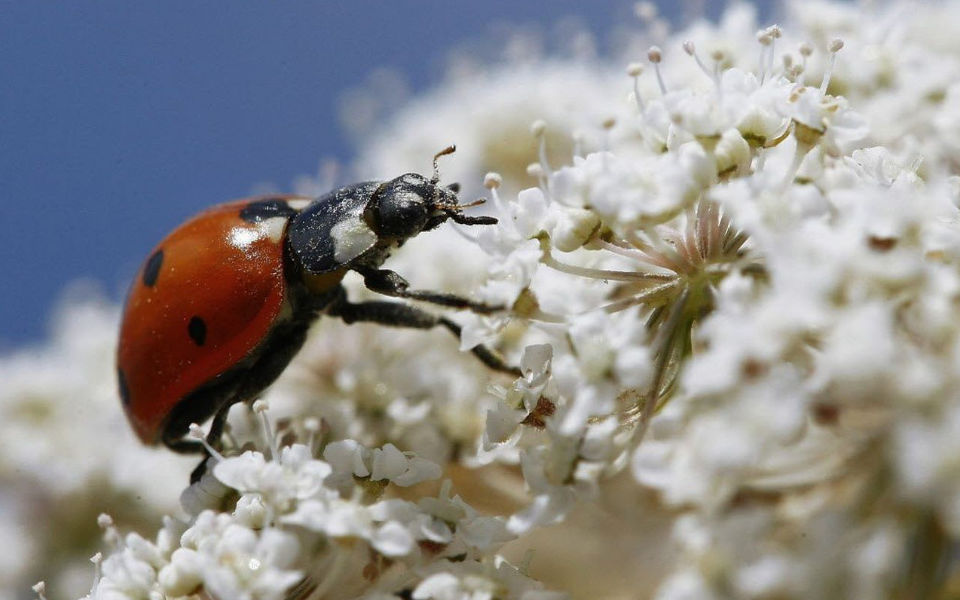
e) Organic Gardening
Organic gardening is gardening without the use of chemicals, synthetic fertilisers, pesticides and herbicides. This is to, once again, ensure the health of the soil It also creates soil that functions as a living organism. The quality of nutrients in vegetables grown organically far outweigh those of hydroponic and synthetically enhanced crops, which are usually monocultures and get sprayed with poisons to keep insects and diseases away.
f) Guerilla Gardening
Guerilla gardening is a way of planting food on land that you don’t own or lease. It is a rebellious, revolutionary way of fighting against a system that is intent on making citizens reliant on paying for healthy, whole foods. Anyone can be a guerilla gardener.
Find a piece of land that is not being used and start planting fruit trees, vegetables, herbs and other medicinal plants. In the UK we are lucky to have the option of leasing allotments and starting community gardens. And this idea has spread to other parts of the world. Russia has for many years used the summer seasons for planting vegetables in allotments where Russians go to spend summers. Russia is a county that encourages self-sufficiency, despite bad press and propaganda from mainstream media.
g) Urban Gardening
Do you live in the city? Or a small apartment with no outside garden? This should not stop you from having a go at planting your own greens and easy-to-grow vegetables. Even flowering plants bring joy to a small living space and many flowers are edible. This means you can add them to salads or use them as garnishes when entertaining guests.
2. How to Create a Garden Anywhere: Container Planting
Visit your local nursery or peruse the many online shopping sites that will deliver to your door all you need to start your own planting projects. The easiest things to grow are herbs and greens.
First study your living space. Which areas get the most light? Do some areas get morning light and others afternoon sun? Are there areas that get through-flowing drafts, or are there extremely dark areas?. Some house plants grow well in dark areas, others purify the air. If you have a sunny window ledge or a small outside space, get a rectangular flower box and plant rocket, basil, spinach, and strawberries together. In another container, plant rosemary. Plant mint in its own planter or even in a hanging basket, as mint loves to trail. Choose plants and herbs that you will use when you cook. Otherwise, it is just a waste of time and effort. Get ferns for damp areas like bathrooms, where the steam will encourage the foliage to thrive.
3. List of Gardening Tools
When it comes to garden tools, it depends completely on what kind of gardening you’ll be engaging in.
For a large outdoor garden you’ll need the following:
- Spade
- Rake
- Gardening fork
- Secateurs
- Hedge cutters
- Pruning List of Garden tools
- Ladder
4. Planting Calendar for Gardening in the UK
Here are some free resources if you’d like to find out more about what to plant in the UK, and when.
- Free British seasonal planting calendar (pdf) Click here
- Free download fro Scottish planting seasons (pdf) Click here
References to Studies in this Article
[1] Mayo Clinic on calorie burning
[2] Study on physical benefits of gardening
[3] Study on reducing stress through gardening
[4] Microbes in soil boost immunity
[5] Cardio fitness reduces heart disease
[6] Cardio fitness reduces dementia
[7] Cardio fitness on brain health and joints
[8] Cardio and cholesterol (blood lipid profile)
[9] Benefits of gardening on cognitive function
[10] Benefits of gardening on serotonin levels
[11] Benefits on brain function, memory
[12] Korean Study
[13] Stress reduction and gardening
[14] Social benefits of gardening. And [14a]
[15] Therapeutic effects of gardening
[16] Forest gardens
[17] Grounding and barefoot gardening
[18] Electrical charges of grounding
[19] Mindfulness and creativity
[20] Mindfulness
[21] Therapeutic benefits of indoor gardening for the elderly. And [21a]
[22] Gardens and children’s development
[23] mindfulness training for children through gardening

